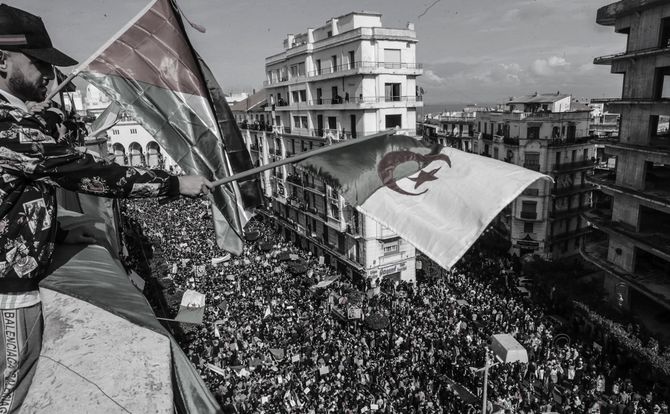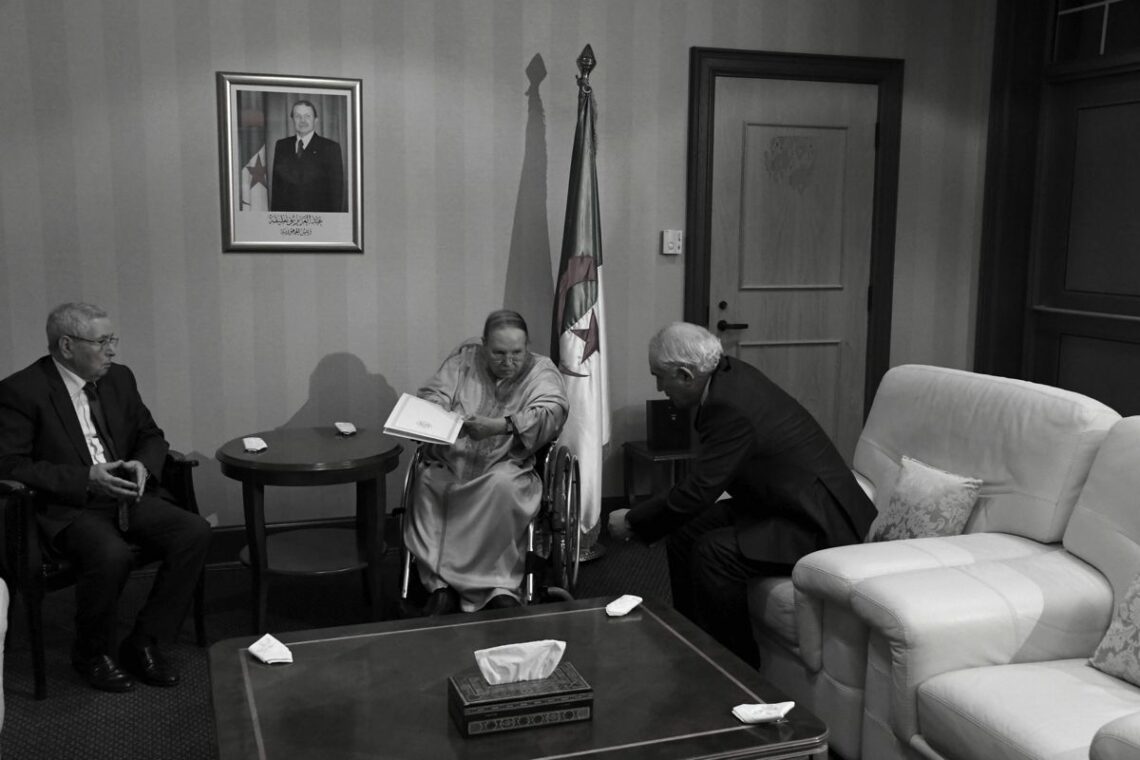An Algerian spring?
Algerians realize they have a historic opportunity to remove the country’s ruling coterie. Yet, as the protests movement grows and the momentum for regime change in Algeria builds, there is a reason to worry about the people’s expectations.

In a nutshell
- Interlocking fiscal and succession crises made Algeria’s regime vulnerable
- A spontaneous protest movement took advantage, but its structure is ill-defined
- Popular aims may be closer to national socialism than openness and free markets
Since February, like clockwork every Friday, massive popular demonstrations take to the streets of Algeria’s cities. This despite a ban on such protests that has been in effect since 2001, near the end of Algeria’s decade-long civil war against Islamic rebels. Algerians abroad have also demonstrated in places like Paris or Montreal.
Young people, who represent a large part of the population (more than half of which is under 30) and suffer disproportionately from unemployment (recent estimates put the youth jobless rate at between 30 and 50 percent), are obviously overrepresented. But one also sees doctors, lawyers, architects, shopkeepers, and plenty of working people. To outside observers, what has been most striking is the dignified, peaceful behavior of the demonstrators.
Unplugging the ‘system’
Their apparent grievance was the intention of Algeria’s 82-year-old President Abdelaziz Bouteflika, who had been in power since 1999, to run for a fifth term in the April presidential election. Mr. Bouteflika has been virtually moribund since 2013, when he suffered a debilitating stroke that confined him to a wheelchair and left him unable to speak. In mid-March, after an extended stay at a Swiss hospital, he gave in to public pressure and said he wouldn’t seek reelection; the April ballot was postponed indefinitely. That only infuriated the protesters, while persuading the army it was time to cut its losses and drop the president. On April 1, it was announced that he would resign before April 28.
But is getting rid of Mr. Bouteflika enough? On a deeper level, the Algerians want to change what they call “the system.” As we showed in a previous report, Algeria is a political and economic dictatorship, with a subtle form of power-sharing. Rents from hydrocarbons (which represent 98 percent of the country’s exports) and quasi-monopolies on imports have enriched a small ruling clique. Its members and their networks – the presidential clan, the National Liberation Front (FLN), the army and the security services – live at the expense of the rest of the population, which suffers from a lack of economic freedom and a dismal business climate that breeds poverty and inequality.
Falling oil prices made it harder for the authorities to buy social peace with public investments and subsidies.
This closed, rent-based economy’s lack of diversification was for quite some time offset by ample income from hydrocarbons. But the fall of oil prices since 2014 (even with the brisk recovery of 2017-2018) made it more complicated for the authorities to buy social peace with public investments and subsidies for food and fuel. More recently, the dramatic drop of Saharan blend since November (from more than $80 per barrel to just above $50 in January) probably signaled that the “system” could not afford to keep its promises.
Ordinary Algerians knew the score. Once the election was over, it was clear to everyone that public spending would have to be reduced. This knowledge supplied the spark and the opportunity to initiate political change. After all, the combination of a fiscal crisis precipitated by low oil prices and a geriatric joke of a presidential candidate is not the kind of leverage that occurs often. Now, after winning their first victory with Mr. Bouteflika’s resignation, it only makes sense for the Algerian people to keep up the pressure.

More change seems warranted since the latest developments can be interpreted as a military coup, disguised by a lot of rhetoric about the army being “on the side of the people.” In fact, the army has always been Algeria’s main power broker. President Bouteflika rode to power with its support in 1999. Twenty years later, the military still has the final say. On March 26, chief of staff General Ahmed Gaid Salah (promoted to his post by Mr. Bouteflika in 2004) broke with the president, urging his old friend to step down in a televised address. By April 2, he was using harsher language, calling the Bouteflika clan a “band” guilty of “conspiracies, fraud, embezzlement and duplicity.” Investigations into several businessmen linked to the president’s circle have been announced.
This sort of flip-flopping is not likely to win over many hearts and minds. For ordinary Algerians, the preferred option might be to unplug the entire system, including the good general.
For better or worse
For now, much of the official talk in Algiers is about how the army can help “smooth over” a political transition (the preferred term is “transition apaisée”). It is possible that the younger generation of officers will choose the people’s aspirations over their superiors’ orders and the system’s discredited ways. But even assuming the military is willing to relinquish its grip, Algeria’s future does not look promising, because change could move in unwelcome directions.
Part of the problem is that the vocabulary of change and reform has been abused in Algeria. Since the 1990s, the country has experienced several top-down “liberalizations,” both in domestic politics, when multiple parties were allowed, and in the economic realm, when limited privatization was introduced. As in many other authoritarian regimes, however, these reforms were just a facade.
The government’s fake reforms gave rise to a popular narrative against free markets and globalization.
Multiparty elections were arranged to prevent the emergence of any serious democratic opposition. Economic liberalization, outside the context of the rule of law, simply ended up reinforcing nepotism and the privileges of the few, to the detriment of market competition. What these fake reforms did accomplish, however, was to fuel a popular narrative against free markets and globalization.
Another feature is that many demonstrators are leery of foreign influences. Of course, after the Libyan fiasco, one can understand why ordinary Algerians do not want “help” from outside. However, another reason for their suspicion is that many powers, notably France, have quietly propped up the regime for geopolitical reasons. For them, the Algerian government has been above all a reliable oil and gas supplier and a ruthless, efficient ally against terrorism. No wonder the people of Algeria have little use for such foreign “friends.” This could encourage economic isolationism after a revolution.
Mistrust of economic “liberalization” and foreign countries, combined with frustration at the injustices of the regime, have made the populace receptive to what could be called the “nationalist left.” At present, this orientation is not represented by any organized group, especially as the demonstrators seem skeptical of traditional parties. But such aspirations could crystallize in a return to Algeria’s original socialist project – which was not exactly a success.
For decades, Algerians have suffered under more or less drastic forms of authoritarianism. What they need now is the rule of law, openness and economic freedom.






